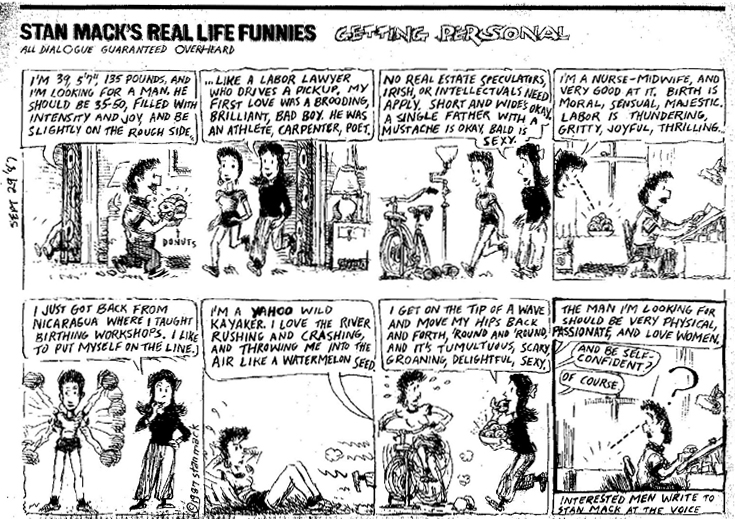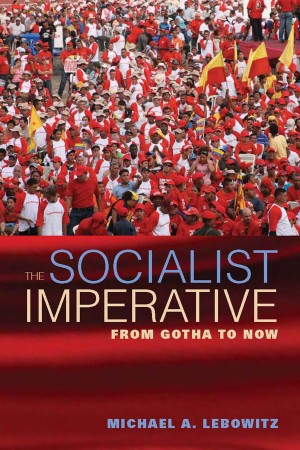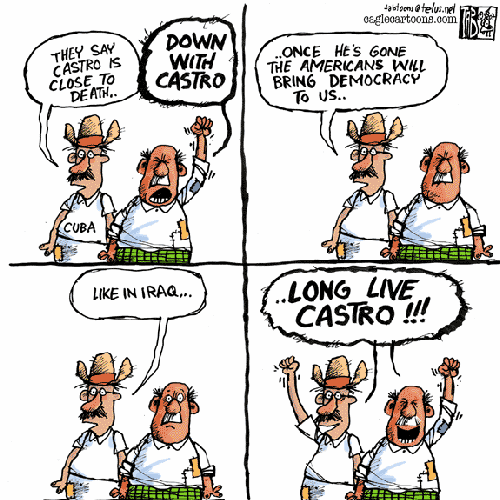English Language Sources 24
Stan Mack: “Getting Personal”
Thanks to cartoonist Stan Mack for permission to share.
To me it’s a great commentary on the perfectionism which some women put in their personal ad profiles describing the kind of men they’re seeking. Published in 1987, in New York’s VILLAGE VOICE newspaper, and still valid, three decades later. (in 2016)
Stan Mack’s website: http://www.stanmack.com/

To me it’s a great commentary on the perfectionism which some women put in their personal ad profiles describing the kind of men they’re seeking. Published in 1987, in New York’s VILLAGE VOICE newspaper, and still valid, three decades later. (in 2016)
Stan Mack’s website: http://www.stanmack.com/
Harry K. Nier, Jr (1925-2015)
- English
- Español
HARRY K. NIER, JR.
August 13, 1925 – June 8, 2015
The “Yankee Fidel” Harry K. Nier, Jr. was born in New York City to Harry K. Nier, Sr. and May Ostericker. At the age of six months, his family moved to Denver where he attended East High School and the University of Colorado in Boulder. He served in the U.S. Army in Burma and returned to Colorado to attend law school. After graduation, Harry was drawn to social justice and became part of an extraordinary group of lawyers that included Rudy Schware, Gene Dykeman, and Walter Gerash in the 1950s. Together they represented and defended radicals and leftists called before the House of Un-American Activities Committee, the SDS, the Crusade For Justice, Vietnam War draft resisters, and they did so successfully and virtually free of charge. Harry became known as the “Social Justice Lawyer” for his representation of the persecuted and oppressed.
Harry had a passion for socialism and the country of Cuba. His hero, Fidel Castro, was born on the same date as Harry one year later. He admired Fidel and in 1959 was present for Fidel’s famous “dove on the shoulder” speech in Havana. Harry joked that when they met, Fidel thought Harry was a “Brasileno” due to his strange Spanish accent. Harry closely followed the trials and tribulations of U.S – Cuba relations from the 1962 missile crisis to the present thawing of relations. He never gave up hope that someday the U.S. and the Cuban governments would resume diplomatic relations on equal grounds. Harry helped with many Cuban social justice causes around the country giving his time and talent often pro bono. He worked on the Elian case in 2000 to allow Elian, a minor, safe passage back to Cuba. While in Washington, D.C., Harry represented Elian’s father, Juan Gonzalez, to return him to Cuba. He worked to free the famous “Cuban Five”, the Cuban national heroes jailed in the U.S., but relatively unknown to the U.S. public. Harry supported Antonio Guerrero Rodriguez, one of the Cuban Five incarcerated in Florence, Colorado, and hosted Antonio’s mother when she came to visit her son. In 1994, he testified before Congress in support of the Free Trade with Cuba Act. While Harry did not live to see the economic Blockade against Cuba lifted, his dream of freedom for Cuba will be fulfilled in part by the efforts he made and the gifts he left behind.
Harry’s socialist beliefs were rooted in American idealism. He was deeply involved in the civil rights movement. He marched along side Dr. Martin Luther King in the deep-south and attended King’s famous “I Have a Dream” speech on the steps of the Lincoln Memorial. He performed legal work for the National Lawyer’s Guild Southern Legal Committee in Mississippi. After the “Day of Draft Resistance” in 1967, he represented draft inductees indicted by the Feds for non-possession of draft cards and challenged the legality of the draft and the Vietnam War. He represented the U.S. Women’s Olympic Volleyball Team in an effort to prevent the 1980 Olympic Boycott of the Moscow games. He worked with the Chicano Movement and in support of Jobs For Justice. In 1999, he attended the Seattle World Trade Organization protests in Seattle and helped bail out arrested protesters. Harry was a fierce defender of worker’s rights and critic of the capitalistic exploitation of labor all over the world. In 1977, when President Carter lifted the travel ban to Cuba, Harry took tours to Cuba to educate Americans about the virtues of Cuban political policy. Harry traveled to all over the world, but he loved traveling to Cuba taking as many dozens of trips over the years.
Harry supported many organizations including: the Center For Cuban Studies, the Cuban Institute For Friendship With The Peoples (ICAP), Fair Play For Cuba, National Emergency Committee for Disaster Relief to Cuba, National Committee to Free the Five, the American Friends Service Committee, Colorado Bar Association, National Lawyers Guild, Boycott Coors, End the Blockade Against Cuba Committee, Freedom to Travel to Cuba Campaign, Denver-Havana Friendship Project, Hands-Off Cuba Project, July 26th Movement, Free The Cuban Five, Pastors For Peace, the Rocky Mountain Center for Peace and Justice, the Colorado Mountain Climbing Club, the Brother Jeff Center, the Jewish Community Center, Hands-Off Iraq Project, the Colorado Council of Churches and the NAACP. Harry read and supported Cuban publications including Granma, CubaNews, Baragua, Building Bridges, Cuba Advocate, De Todo Un Poco, Montlibre, and the inCUBAtor.
In law and in life Harry was a tireless advocate and he loved the outdoors. He climbed all 54 Colorado Fourteeners and Pico Turquino, the highest mountain in Cuba, from the foothills of which Fidel launched his revolutionary assault on Havana. Harry was a man of deep political conviction and his passion and spirit for social democracy will be forever missed.
Thanks to Emily Oswald Coffey for these materials.
HARRY K. NIER, JR.
13 de Agosto de 1925- 8 de Junio de 2015.
El “Fidel Yanky” Harry K. Nier, Jr. nació en la Ciudad de Nueva York, hijo de Harry K. Nier y de May Ostericker. A la edad de seis meses, se mudaron a la Ciudad de Denver. Harry se graduó de la preparatoria “East” y de la Universidad de Colorado en Boulder. Él sirvió dentro de las fuerzas armadas de los Estados Unidos en Birmania y regresó a Colorado para ingresar en la escuela de leyes. Después de graduarse, Harry se interesó en la justicia social y en la década de los 50’s, formó parte de un extraordinario grupo de abogados, entre los cuales se encontraban Rudy Schware, Gene Dykeman y Walter Gerash. Juntos representaron y defendieron a radicales e izquierdistas, entre los cuales se encontraban el comité de la casa de actividades no americanas, los estudiantes por una sociedad democratica, la cruzada por la justicia y la junta de resistencia a la guerra de Vietnam. Esto lo hicieron exitosamente y literalmente sin cobrar nada. Harry fue conocido como “el abogado de la justicia social” por defender a los perseguidos y oprimidos.
Harry tuvo pasión por el socialismo y por Cuba. Su héroe, Fidel Castro, nació en la misma fecha que Harry tan solo un año después. El admiraba a Fidel y en el año de 1959 estuvo presente en La Habana durante el famoso discurso de Fidel “Una paloma en el hombro”. Harry bromeaba sobre cuando conoció a Fidel, este pensó que Harry era “Brasileño” por su extraño acento para hablar el español. Harry siguió muy de cerca los problemas en la relaciones entre Estados Unidos y Cuba durante la crisis de los misiles en 1962. El nunca perdió las esperanzas de que algún día los gobiernos de Estados Unidos y Cuba restablecieran relaciones diplomáticas en igualdad de condiciones. Harry colaboró en muchas de las causas sociales Cubanas a los largo del país, dando su tiempo y su talento en muchas ocasiones pro bono. En el año 2000, trabajó en el caso “Elian” y logro que Elian, un menor de edad, pudiera regresar a Cuba. Mientras, Harry representaba en Washington D.C. al padre de Elian, Juan González, para su regreso a Cuba. El trabajo para el famoso “los cinco de Cuba”, los héroes nacionales Cubanos, presos en los Estados Unidos, y relativamente poco conocidos por la opinión publica de los Estados Unidos. Harry ayudó a Antonio Guerrero Rodríguez, encarcelado en Florence, Colorado y hospedo a la madre de Antonio cuando vino a visitar a su hijo. En 1994, testificó ante el Congreso en apoyo al libre comercio con Cuba. Harry no pudo vivir para ver el bloqueo económico sobre Cuba liberado, pero sus sueños de libertad para Cuba serán completos, en parte por los esfuerzos que el llevo a cabo y los regalos que el dejo.
Las creencias socialistas de Harry se enraizaron dentro del idealismo Americano. Estuvo profundamente involucrado en los movimientos de derechos civiles. Marchó junto al Dr. Martin Luther King en profundo sur y asistió al famoso discurso de King “Tuve un sueño” a las afueras del “Lincoln Memorial”. El llevó a cabo trabajo legal para el gremio nacional de abogados Sureños en Mississippi. Después del “Día del proyecto de resistencia” en 1967, el representó a los acusados por el gobierno federal de no tener tarjeta de reclutamiento, desafiando la legalidad del proyecto y de la guerra de Vietnam. Harry representó al equipo norteamericano femenino de voleibol en sus esfuerzos para evitar el boicot a los juegos olímpicos de Moscú 1980. Él trabajó con el movimiento Chicano en apoyo de trabajos justos. En 1999 acudió a las protestas que se llevaron a cabo en la organización mundial de comercio en Seattle y ayudó a rescatar a los manifestantes arrestados. Harry fue un fiero defensor de los derechos laborales y un crítico de la explotación laboral del capitalismo al rededor del mundo. En 1977, cuando el Presidente Carter liberó la prohibición de viajar a Cuba, Harry hizo viajes a Cuba para educar a los americanos acerca de las virtudes de la política Cubana. Harry viajo a lo largo del mundo, pero él amaba viajar a Cuba, haciendo docenas de viajes a lo largo de los años.
Harry ayudó a muchas organizaciones incluyendo: El centro para los estudios Cubanos, el Instituto Cubano de amistad con el mundo (ICAP por sus siglas en ingles), juego limpio para Cuba, el comité de alivio para emergencias por desastres en Cuba, comité nacional para la libertad de los cinco, comité amigos americanos de servicios, el colegio de abogados de Colorado, el gremio nacional de abogados, boicot a la empresa Coors, el comité para el fin del bloqueo contra Cuba, la campaña para la libertad de viajar a Cuba, el proyecto de amistad Denver-La Habana, el proyecto manos fuera de Cuba, el movimiento del 26 de julio, libertad para los cinco Cubanos, pastores por la paz, el centro de las montañas rocallosas para la paz y la justicia, el club de alpinismo de Colorado, el centro hermano Jeff, el centro comunitario Judío, proyecto manos fuera de Irak, el consejo de iglesias de Colorado y la asociación Nacional para el progreso de la gente de color. Harry leyó y apoyo publicaciones Cubanas, incluyendo Granma noticias de Cuba, Baraguá, construyendo puentes, el defensor Cubano, de todo un poco, Montlibre y el InCUBAtor.
Tanto en su trabajo como en su vida, Harry fue un incansable defensor y amante de la naturaleza. El escaló los 54 picos de Colorado, superiores a los 14,000 pies y el pico Turquino, la más alta montaña en Cuba; en las faldas de dicho pico Fidel lanzó su asalto revolucionario a La Habana. Harry fue un hombre de una convicción política profunda y su pasión y espíritu por la democracia social será extrañada por siempre.
The Socialist Imperative; From Gotha to Now (2015)
THE SOCIALIST IMPERATIVE; FROM GOTHA TO NOW (2015)
by Michael A. Lebowitz [excerpts]
Monthly Review Press (2015)
pp. 135-6
Socialism: The Goal, the Paths, and the Compass
At the February 2010 Havana Book Fair, I presented my short book, El Socialismo no Cae del Cielo: Un Neuvo Comienzo, which had been published in 2009 by Ciencias Sociales (Cuba) and earlier in 2007 by Monte Avila (Venezuela). The book contained sections from Build It Now; Socialism for the 21st Century (in particular, “Socialism doesn’t fall from the sky,” well-known in Venezuela because of Chcivez’s many references to it on television and available in several free editions), and this was supplemented for Monte Avila with a new beginning, “New Wings for Socialism” from Monthly Review (April 2007). The talk provided an opportunity to introduce Cubans explicitly to the concept of “the elementary triangle of socialism,” the goal developed in “New Wings” but not named in the new book. It also was an occasion to talk about difficulties and obstacles along the path to the goal—obstacles such as those faced by Cuba then and now. Without mentioning Cuba at all, I spoke about what I had observed in Vietnam a few months earlier, and I am certain that the Cubans present understood my cautionary tale. Discovering a new path without getting lost is always challenging, and I hope that the publication by Ciencias Sociales in 2015 of the Socialists Alternative. Real Human Development, in which the argument of the socialists triangle is fully developed, will be useful.
pp. 150-151
A more recent example of the concept of democracy as consultative participation was cthe extensive discussion in Cuba over the “lineamientos,” the guidelines for the party that were circulated by the party. These were the guidelines that have set Cuba on its current path to “update” the model. Everyone was mobilized for discussions—in workplaces, neighborhoods, everywhere. The party coordinated these discussions in each separate location, and, on the basis of reports, made adjustments. For example, the great concern expressed in many meetings about the phasing out of the libreta (the set of subsidized necessities) and the release of large numbers of people from state employment led to a slowing down (although, it must be noted, not the reversal) of these decisions.
Subsequently in Cuba there were discussions of a new labor code. Here again there was extensive discussion of the document initiated by the party. As in the case of the discussions of the guidelines, this participation plays an important role in transmitting concerns from below, while at the same time educating those below as to the proposal. However, these discussions are constrained. For example, in the case of the labor code, there was no place for a general discussion of worker management. Further, there was no means for communicating from one workplace to another; rather, collective atomization characterized the process.
All of this is logical from the perspective of the conductor: he is the one who knows the score. He alone knows the whole and, therefore, activity outside this framework is to be discouraged. Further, the logic of the conductor is such that there can be only one conductor; it is, after all, essential that there be unity at the top because in its absence this would confuse the players.
There is absolutely no doubt that extensive discussions, for example, in Cuba, distinguish that society from many others. However, participation in this case is not the same as the opportunity to develop capacities through protagonistic democracy. What kinds of people are produced in this relation? Not what Marx called rich human beings. Not people who have transformed themselves through their activity and are confident in their own powers. As the Soviet Union, China, and other countries characteristic of the “real socialism” of the twentieth century demonstrated, such relations do not build the protagonistic subjects who have the strength to prevent the restoration of capitalism. The people produced within this relation are people without power.
Monthly Review Press
http://monthlyreview.org/books/pb5465/
Subscribe to Blog via Email
| M | T | W | T | F | S | S |
|---|---|---|---|---|---|---|
| 1 | 2 | 3 | 4 | |||
| 5 | 6 | 7 | 8 | 9 | 10 | 11 |
| 12 | 13 | 14 | 15 | 16 | 17 | 18 |
| 19 | 20 | 21 | 22 | 23 | 24 | 25 |
| 26 | 27 | 28 | 29 | 30 | 31 | |



You must be logged in to post a comment.